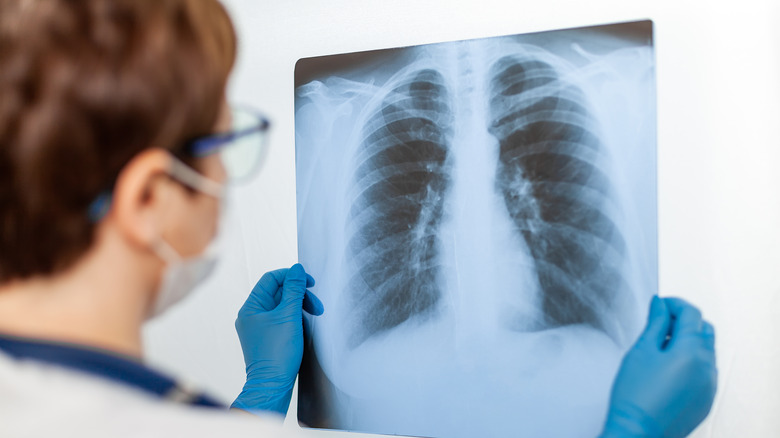Bernie Mac's Cause Of Death Explained
The comedy community and the world at large lost a great talent when Bernie Mac died in 2008. His death came as a shock to many, particularly because he was only 50 years old at the time. As People reported in the days following Mac's death, he died of complications related to pneumonia. Specifically, People specifies that Mac suffered cardiac arrest after being hospitalized for pneumonia. In an interview with the magazine, his sister-in-law Mary Ann Grossett revealed that the comedian succumbed once and was resuscitated. The second time Mac went into cardiac arrest, the event ultimately killed him. Grossett also stated that, although his condition was in remission, it was very likely that Mac's sarcoidosis played a role in his death.
Diagnosed in 1983, Mac dealt with the inflammatory lung condition throughout most of his career. In 2006, he and his wife, Rhonda, helped create the Bernie Mac Foundation which, according to its website, was intended to be a go-to resource for people with sarcoidosis and the professionals who treat them.
What is sarcoidosis?
Sarcoidosis is a relatively rare condition that causes inflammation inside the body. The National Heart, Lung, and Blood Institute (NHLBI), part of the National Institutes of Health, explains that it can affect any organ but most often affects the lungs and lymph nodes in the chest. Sarcoidosis develops either through infection or through exposure to an environmental trigger such as mold, insecticides, or other chemicals and compounds that lead to inflammation.
Once the condition develops, the immune system sets off an inflammation reaction. Normally this reaction would help combat viruses and other infections in the body. But with sarcoidosis, this reaction goes wild and forces immune system cells to form clumps called granulomas. Over time the granulomas and chronic inflammation can cause scarring in the body. When this scarring takes place in the lungs, it reduces the organ's functional capacity (via Scientific American).
As NHLBI explains, there is currently no cure for sarcoidosis. Treatment options are aimed at sending the condition into remission, as Mac's was at the time of his death. In some cases the condition can even go away on its own. Doctors evaluate each case and administer treatments on an as-needed basis.
Sarcoidosis risk factors
The NHLBI lists several risk factors for the development of sarcoidosis. In addition to contracting a virus that triggers the immune system or working near inflammation-causing substances, a person's race and biological sex both play a large role in their risk of developing sarcoidosis. The condition presents most often in people of African or Scandinavian descent. Scientific American explains that a person's ethnicity can also affect how the disease progresses. It progresses more aggressively in people of African descent, while it eventually clears up in 80 to 90% of Caucasian patients. Women also tend to develop the condition more often though, as in Mac's case, it can develop in men. According to Scientific American, sarcoidosis was also possibly involved in the death of NFL great, Reggie White.
Other risk factors include having close family members develop sarcoidosis. It is also more likely to develop in people who are taking drugs to treat cancer, HIV, or other immune system flareups. Conditions like lymphoma can also increase the risk, as can a person's age. Sarcoidosis can develop at any age, but it is more common in people over the age of 55.
Sarcoidosis symptoms
Sarcoidosis can present without any symptoms, at least until the granulomas and scarring become more pronounced. At that point, the NHBLI explains that people may experience a dry cough and shortness of breath. They may also experience chest pain and hear a wheezing sound when they breathe. Symptoms can also occur outside the lungs. They can include blurred vision, fever, and joint pain associated with the condition's inflammation. The lymph nodes in the person's chest, groin, armpits, chin, and neck may also become swollen. And in some cases people with sarcoidosis may develop a rash called erythema nodosum. It presents as small painful bumps on the neck, head, or legs.
The Bernie Mac Foundation states that Mac learned to take his condition one day at a time, dealing with the symptoms as they came. He would work with a team of doctors to try treatments as they became available, but as the NHLBI says, most treatments are aimed at sending the condition into remission. As yet, no cure has been developed. Current treatments may include anti-inflammatory medications as well as medications intended to suppress the patient's immune system.
Pneumonia complications
Sarcoidosis likely contributed to Bernie Mac's death. However, the star was admitted to the hospital for pneumonia on July 24, 2008, roughly two weeks prior to his death according to People's interview with Mary Ann Grossett. Mac's case was severe enough that doctors placed him on a ventilator as soon as he received his diagnosis.
Eventually the actor asked to be taken off the ventilator. At some point after that, Mac required resuscitation, and he soon after suffered a second cardiac arrest and could not be revived again. This, according to Harvard Health, is an unfortunately common occurrence, though it's more likely to occur in people 65 and older. Once a person in this age range contracts pneumonia, they are four times more likely to experience heart problems, and their risk remains elevated for up to a year after recovery. This increase is caused by the body's attempt to fight off the pneumonia infection. While fighting pneumonia, the body may release chemicals into the blood that increase its chances of clotting. Clots can then form in the wrong places, leading to heart failure and worsening existing heart conditions.
The future of sarcoidosis research
The Bernie Mac Foundation is continuing to bring awareness to sarcoidosis and its impacts. Most recently, Mayor Lori Lightfoot of Chicago named April 21 as the official Sarcoidosis Day. It's a fitting choice as April is, among other things, Sarcoidosis Awareness Month, according to the Foundation for Sarcoidosis Research (FSR).
FSR explains that sarcoidosis is so rare it is often misdiagnosed. ABC News interviewed another sarcoidosis patient in 2008, one who had been misdiagnosed multiple times. Doctors told her it was a brain tumor or multiple sclerosis. A few even told her it was simply stress or that she was imagining things. Ultimately she was diagnosed with sarcoidosis. ABC News also interviewed Dr. David Moller, director of the Johns Hopkins University Sarcoidosis Clinic. He explained that sarcoidosis is known to increase a patient's risk of developing pneumonia and reduces their chances of survival, as was seen in the case of Bernie Mac. It is an unfortunate fact affecting millions of people worldwide everyday.
Though there is yet no cure, patients aren't giving up hope. The Foundation for Sarcoidosis Research has a number of resources for those who want to get involved or learn more about this rare condition.
Bernie Mac lived with sarcoidosis for decades
Bernie Mac battled the inflammatory autoimmune disease sarcoidosis for 25 years. According to the American Lung Association, fewer than 200,000 people in the United States are affected by the illness. However, it often causes severe pulmonary disease in the Black population, resulting in more hospitalizations and early death, says a 2020 review in Frontiers in Immunology.
The actor-comedian was under the care of specialists for many years and took part in cutting-edge sarcoidosis treatments. He believed in a mind-body connection and kept a rigorous exercise and strength-training regimen, as well as a healthy diet, according to the Bernie Mac Foundation, a nonprofit that Mac and his wife formed to be a resource for others with the disease.
The majority of sarcoidosis patients do not need treatment. "Fortunately, most patients with sarcoidosis have no or minor complaints, and lead a relatively normal life," says the Icahn School of Medicine at Mount Sinai. However, in about 30% of cases, Bernie Mac's among them, the disease will become chronic or worsen — meaning those individuals will continue to fight it over a long period of time.
Immunosuppressives may have made things worse
Patients with long-term, or chronic, sarcoidosis are usually prescribed immunosuppressive medications to keep the disease inflammation in check. Methotrexate and azathioprine, and biologics, are some of the go-to drug therapies, according to the Foundation for Sarcoidosis Research. Immunosuppressives dampen the body's immune system response and are powerful enough to put autoimmune diseases, such as sarcoidosis, into remission. However, they also make patients more vulnerable to infection, says the Cleveland Clinic. It was pneumonia that took the life of Bernie Mac in the prime of his life.
While a healthy immune system typically overcomes a lot of common infections, someone whose immune system is suppressed will be much more susceptible to complications. "A 50-year-old does not generally die from pneumonia," says Dr. David Moller, former director of the Johns Hopkins University Sarcoidosis Clinic in Baltimore (via ABC News). "It is known that sarcoidosis can increase someone's risk for developing pneumonia."








